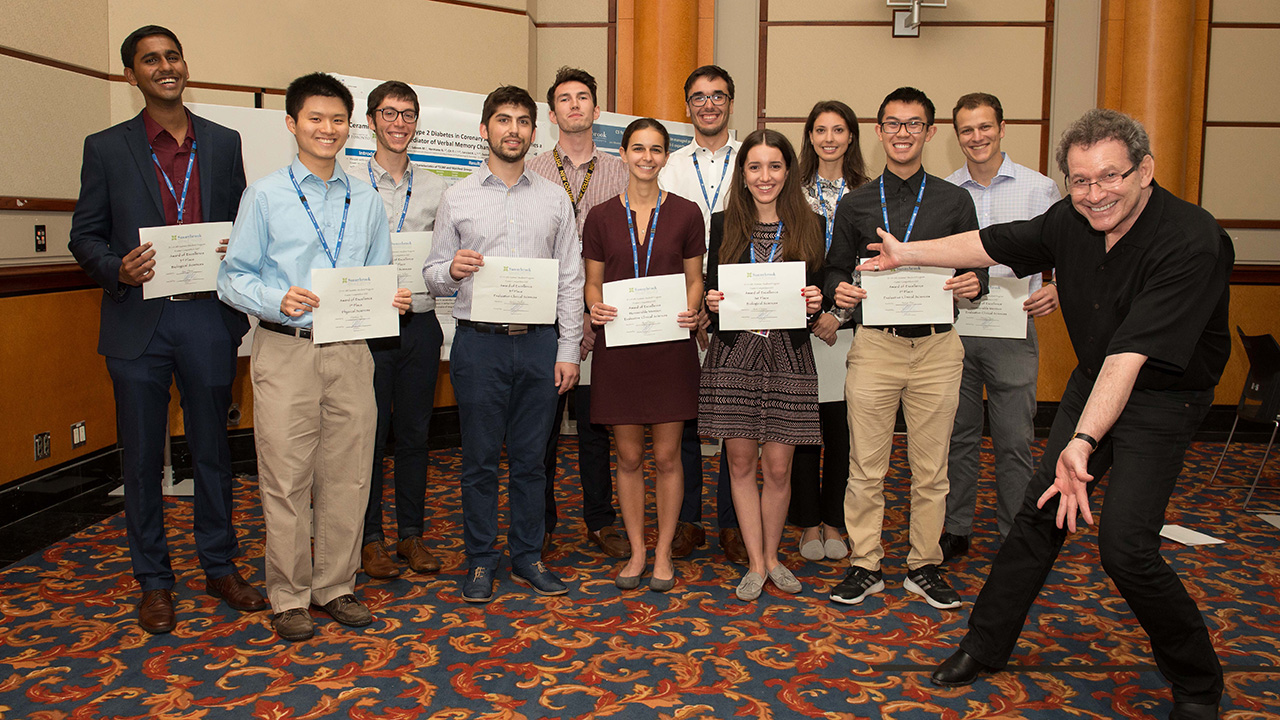Summer students spar for supremacy
Sunnybrook Research Institute (SRI) is seldom referenced as a site of cutthroat combat. Once a year, however, it transforms into a battlefield as students in the D+H SRI Summer Student Research Program remove their safety gloves, hang up their lab coats and engage in fierce contest at the annual poster competition.
This year's event was no different.
Since May, SRI has opened its doors to undergraduate students with a burning passion for science. With the help of experienced researchers, the students worked diligently on a wide array of projects. On Aug. 17, 2017, 63 of them congregated to present their findings and contend for triumph.
As a panel of 19 judges surveyed the auditorium where the action unfolded, the students—including 14 from Biological Sciences, 30 from Evaluative Clinical Sciences and 19 from Physical Sciences—communicated their work and vied for victory in the form of $500 and the title of "Best Summer Research Project." One student from each of the three platforms was recognized with a first-place prize. Additionally, three second- and third-place awards were given out, as well as two honourable mentions.
The judges on hand to dole out the coveted awards consisted of scientists, postdoctoral fellows and graduate students from the three platforms. One of the scientists representing Evaluative Clinical Sciences was Dr. Junaid Bhatti, who was enjoying his fourth appearance as a judge. A supporter of the event, Bhatti says it is the "culmination" of the students' efforts and it "encourages them to move forward in the research field." When asked about what he looks for in a winning poster, Bhatti says, "[The posters] highlight how the students have contributed to an overall project, and that highlighting is one of the important things I need to see. I also try to see whether they've shown leadership, innovation and critical thinking."
Dr. Michael Julius, vice-president of research at SRI and Sunnybrook, announced the winners. Before doing so, he praised the students and their diverse projects. "These young, budding scientists have been given the wisdom and insight of some of SRI's best researchers, and they've taken full advantage of it. Their tremendous work reflects it, and I'd like to congratulate them all, not just the winners, on their outstanding efforts."
One of the students who walked away with a first-place prize was Matthew Ng from Physical Sciences. Supervised by Dr. Graham Wright, Ng's project—called "Convolutional neural networks for left and right ventricle segmentation in cardiac MR images"—was centred on machine learning for the purpose of automatically delineating the ventricles of the heart.
Addressing the importance of the work, he says, "The significance is that the contours of the left and right ventricles are useful for the assessment of heart function and guiding cardiac interventions." Ng will begin grad school in U of T's medical biophysics department next month. He plans to put his prize money toward savings.
The other winners from this year's event:
First place:
- Amber Cintosun (Biological Sciences; supervised by Dr. Marc Jeschke): "Non-adhesive microfluidic wound dressing for enhanced wound healing."
- Andrew Tran (Evaluative Clinical Sciences; supervised by Dr. Steve Fremes): "A novel risk stratification score for readmission after discharge from coronary artery bypass grafting."
Second place:
- Joshua De Sousa Casal (Biological Sciences; supervised by Dr. Juan Carlos Zúñiga-Pflücker): "Soluble multimeric fusion protein provides potential for T-cell development in vitro."
- Sandra Fiset (Evaluative Clinical Sciences; co-supervised by Drs. Nir Melamed and Anne Martel [Physical Sciences]): "Prediction of spontaneous preterm birth among twin gestations using machine learning and texture analysis of cervical ultrasound images."
- Brayden Kell (Physical Sciences; supervised by Dr. Martin Yaffe): "Quality control and image analysis for tomosynthesis mammographic imaging screening trial."
Third place:
- Ajay David (Biological Sciences; supervised by Dr. Carol Schuurmans): "Zac1 is essential for regulating Müller glial proliferation in the retina."
- Zack Dulberg (Evaluative Clinical Sciences; supervised by Dr. Brian Murray): "State space analysis of polysomnograms in health and illness."
- Benjamin Solomon (Physical Sciences; supervised by Dr. Nir Lipsman): "The effectiveness of MRI-guided focused ultrasound in the treatment of essential tremor: a one-year follow-up."
Honourable mentions:
- Michael Rosen (Evaluative Clinical Sciences; supervised by Drs. Nathan Herrmann and Krista Lanctôt): "Longitudinal association between late stage lipid peroxidation and depression in coronary artery disease patients."
- Rachel Strauss (Evaluative Clinical Sciences; supervised by Dr. Jeannie Callum): "Sample collection and sample handling errors submitted to the transfusion error surveillance system, 2006–2015."
Aside from the $500 cash prize presented to first-place winners, second-place winners received $300; third-place winners, $200; and honourable mentions, $100. The names of the distinguished students will appear on display plaques at SRI.
The event also featured a CTV News-covered sub-competition called "Tell it to a fifth-grader," whereby six finalists previously selected squared off for a $300 prize. To win, students produced lay summaries of their projects and explained them to a group of fifth-graders, who then decided which project they liked best. University of Toronto student Katie Bozek, who was supervised by Dr. Samira Mubareka in Biological Sciences, won top honours for her project titled, "Environmental sampling for the surveillance of swine influenza virus."
The D+H Corporation partially funds the program and promotes postgraduate research as a career. Next to receiving an immersive research experience at a renowned institute and the mentorship of seasoned scientists, accepted students in the program attend an orientation and are invited to attend a weekly seminar series, which showcases the work of SRI scientists.
Read more about the D+H SRI Summer Student Research Program and take a closer look at some of this year's students by visiting the education and training section of the SRI website.
In a nutshell
- On Aug. 17, 2017, the annual D+H SRI Summer Student Research Program poster competition was held.
- Eleven students were recognized for their efforts over the last four months on a variety of research projects.
- The event attracted media attention and showcased the innovative, diverse work being done at SRI.



